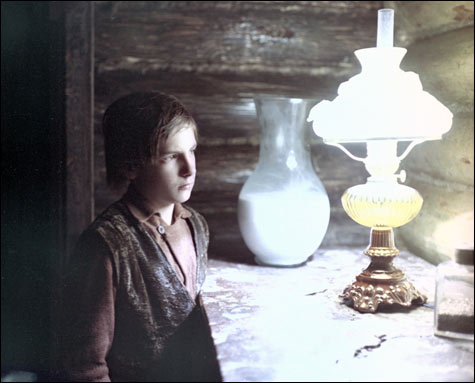
THE MIRROR: Tarkovsky’s film is a unique autobiographical testament. |
Because Mosfilm, the subject of the Museum of Fine Arts’ “Envisioning Russia” retrospective, was the Soviet state production studio, any cross-section of its history lays out the entirety of Soviet film history — not only in its mainstream, but on its catapulting visionary fringes. Of course, Soviet filmmaking always resounded with the electric tension between state propaganda and individualistic artistry, often within a given film. Sure, the famous dialectic montage experiments from the 1920s salad days of Eisenstein and Pudovkin were motivated by pure Marxist guile, but it’s more difficult to see the extraordinary development of the long traveling shot as being anything but cinema rising to its own expressive level in spite of Politburo politics. Mosfilm was still the empire’s Hollywood, churning out populist fodder for the masses while sometimes conscientiously undercutting the government’s simplistic anti-Westernism to degrees that can make our own industry’s McCarthyite years seem outright pathetic.
The retro serves as a crash lesson in Russian film, starting obligatorily with Eisenstein’s BATTLESHIP POTEMKIN (1925; September 11 at 5:15 pm). For too long now, this one has been reflexive university viewing to such a suffocating extent, American students may be surprised to find that early Soviet filmmaking was not all hammer-to-the-head editing and Marxist cant. In fact, Eisenstein’s position as one of the medium’s looming giants has silently deteriorated; the more time passes, the more mechanical and manipulative his work seems. The limitations were built-in: his entire æsthetic was predicated on his being the omniscient god and the audience his easily controlled minions. (Spielberg and Lucas, it could be said, have demonstrated similar sensibilities.) Free of historical intents or contexts, propaganda art is usually beguiling in its naïveté, but Battleship Potemkin feels bitter, as if revolutionary discontent unconsciously expressed Eisenstein’s outrage that of all the nations in all the eras for this artist to be born into, it had to be this one.
Propaganda itself poses a sticky dilemma for retrospective viewing — how do we take it now? As the dreaminess of idealistic kitsch, or as the chilling residue of totalitarian evil? These options imply that the Soviet state left filmmakers few other choices, but that’s not quite true, as you can see in Alexander Medvedkin’s silent HAPPINESS (1934; September 11 at 6:45 pm), an early absurdist fairy-tale parable about human foibles as bizarrely funny as it is lacerating about both tsar-era economic inequity and the futility of collective life. Kolkhoz or no kolkhoz, Medvedkin’s lampooning fantasy sees weakness and mercenary greed everywhere, to the extent of summoning, in the film’s outrageous compositions, anti-clerical zeal, and moments of startling satire (tithe-collecting nuns in transparent blouses, a platoon of soldiers wearing identical cartoon-face masks), the very inappropriate influence of the Surrealists. There’s no record of when Un chien andalou might’ve made its way to Muscovite screening rooms, but its footprint is all over Happiness, and Buñuel’s L’âge d’or serves, with Duck Soup, as a kind of unofficial template for Grigori Alexandrov’s JOLLY FELLOWS (1934; September 17 at 6 pm), the Soviet Union’s first musical comedy, and a scattershot roast of aristocratic indulgence that peaks with the manor house’s being invaded by rampaging farm animals. (Yes, a cow does climb into a bed.) None of this could’ve pleased the censor board. (Medvedkin’s film was loathed by Stalin, but Jolly Fellows, bearing a far simpler socio-political scheme, was a smash hit despite its borrowed irrationalities.) But none of it qualifies as pure propaganda, any more than Buñuel’s excoriations of the bourgeoisie could be construed as Marxist.